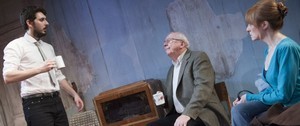SITE GUIDE
SEARCH
REVIEWS
REVIEW ARCHIVES
ADVERTISING AT CURTAINUP
FEATURES
NEWS
Etcetera and
Short Term Listings
LISTINGS
Broadway
Off-Broadway
NYC Restaurants
BOOKS and CDs
OTHER PLACES
Berkshires
London
California
New Jersey
DC
Connecticut
Philadelphia
Elsewhere
QUOTES
TKTS
PLAYWRIGHTS' ALBUMS
LETTERS TO EDITOR
FILM
LINKS
MISCELLANEOUS
Free Updates
Masthead
Writing for Us
A CurtainUp  London Review
London Review
 London Review
London ReviewStep 9 of 12
by Sebastian King
|
I used to see sobriety as advert breaks. — Keith
|

Blake Harrison, Barry McCarthy and Wendy Nottingham (Photo: Mike Lidbetter) |
Step 9 of 12 tells the story of Keith (Blake Harrison), a former alcoholic, on his way to recovery thanks to the popular Twelve-Step Program. As the title suggests, Keith is currently at Step 9, in which sufferers are encouraged to apologise to those they have harmed, and to seek forgiveness. In this instant, the recipients of Keith’s apology are middle-aged couple Alan (Barry McCarthy) and Judith (Wendy Nottingham). The nature of their relationship to Keith and the extent to which he has harmed them are not initially clear, and information is gradually drip-fed to us as the play unfolds.
As Keith, Harrison is a dominating presence. Although there are occasional traces of the gawky Neil in his performance, he successfully manages to shake off the looming shadow of his on-screen persona, in his sympathetic yet disturbing portrait of a man whose life and sanity seem to be in limbo. As his catalogue of misdemeanours increases, we feel more and more distanced from this initially comic character, yet we continue to follow his mental stream of skewed logic. Barry McCarthy’s Alan is a man struggling to do his best in a situation he would rather not be a part of, while Wendy Nottingham as Judith brings an icy tension to the dynamic. Although only appearing in the final few moments, Ben Dilloway, recently seen in Mercury Fur, makes a big impact as the similarly emotionally scarred Mark.
Francesca Reidy’s recreation of Keith’s dilapidated flat, complete with holes in the wall, peeling wallpaper and rising damp is incredibly detailed, and gives a real sense of claustrophobia. The audience are very much part of the action, and there is no escape from the real threat of the situation. In this restricted space, Tom Attenborough’s simple and sensitive direction ensures that the focus remains predominantly on Hayes’s text.
Advertised as a ‘dark comedy’, Hayes’s play definitely focuses on the darkness more than the comedy. Constantly catching the audience off guard, and taking the plot down unexpected pathways, this is absurdism disguised as realism, with a clear nod towards the ‘in-yer-face’ theatre of the 1990s. Its brutal descriptions of acts of sex and violence, and a dangerously realistic fight sequence, leave us feeling unsettled and unnerved, but ultimately gripped in this intense piece by an exciting new voice in British Theatre.
|
Subscribe to our FREE email updates with a note from editor Elyse Sommer about additions to the website -- with main page hot links to the latest features posted at our numerous locations. To subscribe,
E-mail: esommer@curtainup.comesommer@curtainup.com
put SUBSCRIBE CURTAINUP EMAIL UPDATE in the subject line and your full name and email address in the body of the message -- if you can spare a minute, tell us how you came to CurtainUp and from what part of the country. |
| Step 9 of 12
|
|
REVIEW FEEDBACK Highlight one of the responses below and click "copy" or"CTRL+C"
Paste the highlighted text into the subject line (CTRL+ V): Feel free to add detailed comments in the body of the email . . . also the names and emails of any friends to whom you'd like us to forward a copy of this review. |




